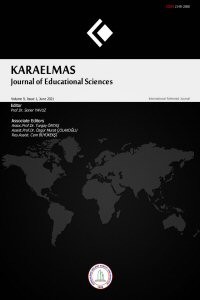Lise Öğrencilerinin İngilizce Dersi Motivasyon Düzeylerinin ve Motivasyon Tiplerinin Belirlenmesi
Başarılı bir kariyer için önemli bir faktör olan İngilizce öğrenimindeki başarısızlık günümüz eğitim sisteminin önemli sorunlarından birisidir. İngilizce öğrenimini etkileyen en önemli faktörlerin başında da İngilizce öğrenmeye yönelik motivasyon gelmektedir. Bu nedenle bu araştırmada, Bartın ilinde öğrenim gören lise öğrencilerinin İngilizce derslerindeki motivasyon düzeyleri ve motivasyon tipleri belirlenmeye çalışılmıştır. Araştırmada veri toplama yöntemi olarak Tarama Modeli kullanılmıştır. Bu kapsamda Bartın ilindeki 18 resmi lise kurumuna devam eden öğrencilerden 323 öğrenciye 159 kız, 164 erkek anket uygulanmıştır. Çalışmanın bulgularına göre öğrencilerin motivasyon düzeylerinin yeterli olduğu, kız öğrencilerin İngilizce öğrenme motivasyonunun erkek öğrencilere göre daha yüksek olduğu ve motivasyonun okul türlerine göre kısmen farklılık gösterdiği görülmüştür. Çalışmanın diğer bir bulgusu ise araçsal motivasyonun, bütünleşmeci motivasyona oranla daha çok tercih edildiğidir
Anahtar Kelimeler:
Motivasyon, Motivasyon Tipi, Başarı, Okul Tipi
Determining the Motivation Levels and Motivation Types of High School Students in English Classes
Failure in the teaching of English, which is an important factor for a successful career, is one of the main problems of the current education system in Turkey. One of the major factors affecting the learning of English is motivation towards learning English. Therefore, motivation levels and motivation types of high school students in English classes in Bartın were determined in this study. Survey Design was used in the study to collect data. A questionnaire was applied to 323 high school students 159 female, 164 male in 18 state high schools in Bartın. According to the results of the study, it was concluded that the motivation levels of students were adequate, female students had a higher level of motivation compared to male ones and motivation partly differed in accordance with the school type. Another finding of the study was that instrumental motivation was favoured more than integrative motivation by students
Keywords:
Motivation, Motivation Type, Achievement, School Type,
___
- Acat, M. B. & Demiral, S. (2002). Türkiye’de yabancı dil öğreniminde motivasyon kaynakları ve sorunları. Kuram ve Uygulamada Eğitim Yönetimi Dergisi, 8(31), 312-329.
- Açıkgöz, K. Ü. (2003). Etkili öğrenme ve öğretme. (5. Baskı). İzmir: Eğitim Dünyası Yayınları.
- Atay, D. (2004). İngilizce öğretmenlerinin motivasyon stratejileri. Hasan Ali Yücel Eğitim Fakültesi Dergisi, 1(1), 99- 108.
- Büyüköztürk, Ş. (2002). Sosyal bilimler için veri analizi el kitabı. Ankara: PegemA Yayıncılık.
- Corder, S. P. (1981). Error analysis and inter language. Oxford: Oxford University Press.
- Csizer, K. & Dörnyei, Z. (2005). Language learners’ motivational profiles and their motivated learning behavior. Language Learning, 55(4), 613-659.
- Çelebi, M. D. (2006). Türkiye’de anadili eğitimi ve yabancı dil öğretimi. Erciyes Üniversitesi Sosyal Bilimler Enstitüsü Dergisi, 21(2), 285-307.
- Damavand, A. (2012). The effects of motivation types (instrumental and integrative) on writing proficiency among Iranian ielts candidates. ZKÜ Sosyal Bilimler Dergisi 8(15), 109-124.
- Dörnyei, Z. (1990). Conceptualizing motivation in foreign language learning. Language Learning, 40(1), 45-78.
- Dörnyei, Z. (2001).Teaching and researching motivation. Essex: Longman.
- Eymur, G. & Geban, Ö. (2011). Kimya öğretmeni adaylarının motivasyon ve akademik başarıları arasındaki ilişkinin incelenmesi. Eğitim ve Bilim, 36(161), 246-255.
- Gardner, R. C. (1985). Social psychology and second language learning: the role of attitudes and motivation. London: Edward Arnold.
- Gardner, R. C. & Lambert, W.E. (1972). Attitudes and motivation in second language learning. Rowley, MA: Newbury House.
- Karasar, N. (2005). Bilimsel araştırma yöntemi. (14. Baskı). Ankara: Nobel Yayın Dağıtım.
- Kaya, M. (1995). The relationship of motivation, anxiety, self-confidence, and extroversion/introversion to students’ active class participation in an EFL classroom in Turkey. (Unpublished master thesis). Bilkent University Institute of Economics and Social Sciences, Ankara.
- Kennedy, J. R. (1996). Variations in the motivation of successful and unsuccessful turkish learners of english. (Unpublished master thesis). Boğaziçi University, Institute of Social Sciences, İstanbul.
- Lamb, M. (2004). Integrative motivation in a globalizing world. System 32, 3-19.
- Lee, H., G. (2012). ESL learners’ motivation and task engagement in technology enhanced language learning contexts. (Unpublished doctoral dissertation). Washington State University, Department of Teaching and Learning, Washington, USA.
- Lier, L. V. (1996). Interaction in the language curriculum, awareness, autonomy & authenticity. New York: Longman.
- Lukmani, Y. M. (1972). Motivation to learn and language proficiency. Language Learning, 22 (2), 261-273.
- McDonough, S. H. (1981). Psychology in foreign language teaching. London: George Allen & Unwin.
- Rivers, W. M., (1984). Communicating naturally in a second language, New York: Cambridge University Press.
- Shabaan, K. A. veGhaith, G. (2000).Student Motivation to Learn English as a Foreign Language. Foreign Language Annals, 33(6), 632-644.
- Spolsky, B. (1989). Conditions for second language learning. Oxford: Oxford University Press.
- Taşpınar, H.K. (2004). Teachers’ and students’ perceptions of teachers’ task–related motivational strategy use and students’ motivation levels. (Unpublished master thesis). Bilkent University Institute of Economics and Social Sciences, Ankara.
- Wei, W., Lu, H., Zhao, H., Chen, C., Dong, Q. & Zhou, X. (2012). Gender differences in children’s arithmetic performance are accounted for by gender differences in language abilities. Psychological Science, 20(10), 1-11.
- ISSN: 2148-2888
- Yayın Aralığı: Yılda 2 Sayı
- Başlangıç: 2013
- Yayıncı: Zonguldak Bülent Ecevit Üniversitesi
Sayıdaki Diğer Makaleler
Köy Eğitmenleri ve Kadro Sorunları
Lise Öğrencilerinin İngilizce Dersi Motivasyon Düzeylerinin ve Motivasyon Tiplerinin Belirlenmesi
İşbirlikçi Öğrenmenin Kavramsal Değişim Üzerindeki Etkisi: Bir Meta Analiz Çalışması
Tanım Açısından Kekemeliğe Yönelik Yeni Bulguların Değerlendirilmesi
Ramazan Şükrü PARMAKSIZ, Mehmet Ali KISAKÜREK
Meltem MARAŞ ATABAY, Elvan KURTMAN
Beyin Temelli Öğrenme Yaklaşımının İngilizce Dersinde Akademik Başarı ve Tutuma Etkisi
İlköğretim 7. Sınıf Türkçe Derslerinde Mizah Kullanımının Öğrenci Başarısına Etkisi
